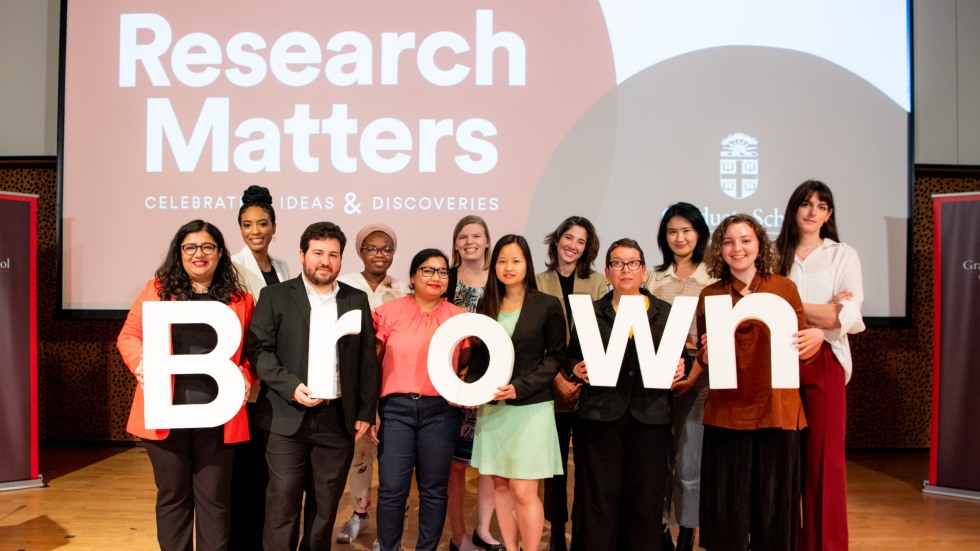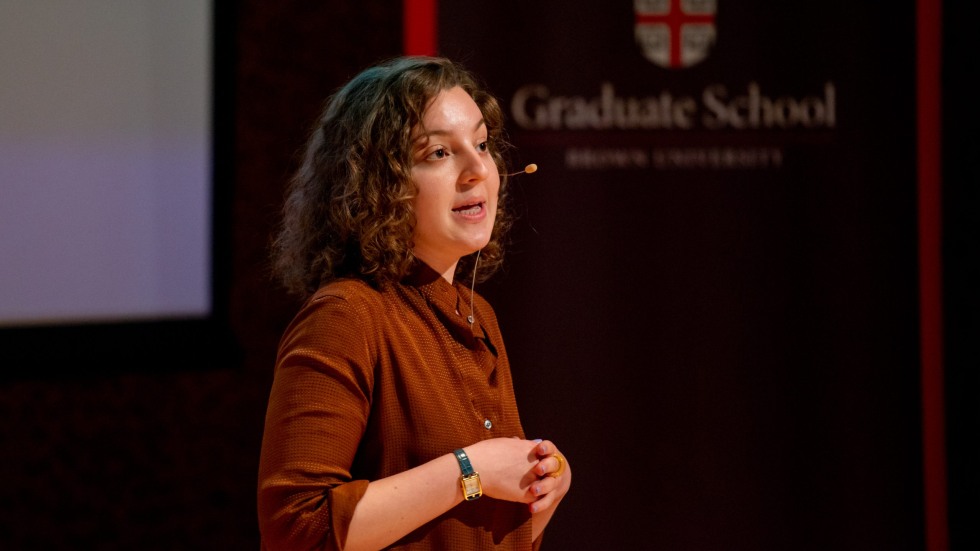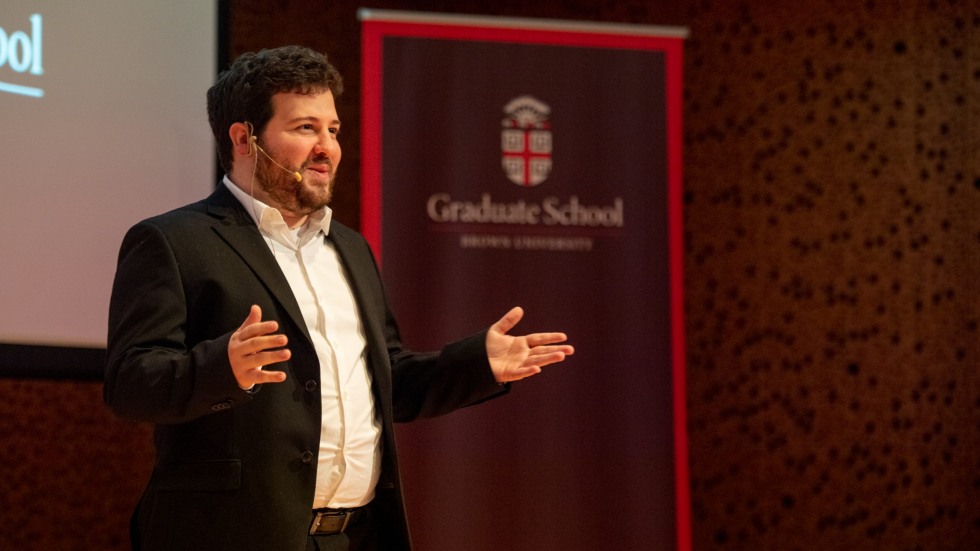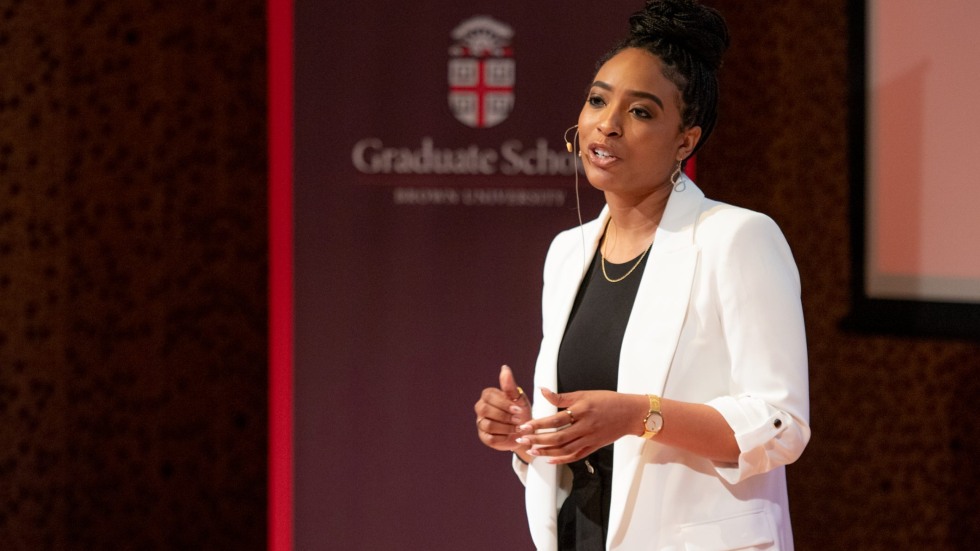Brown University’s annual Research Matters event, held April 19 at Grant Recital Hall, has celebrated and amplified the work of Brown graduate students from across disciplines since 2014. This year, twelve speakers from various fields, including archaeology, applied mathematics and philosophy, delivered concise and clear presentations on their work, TED Talk-style.
From Food Insecurity to Maternal Health: Research Matters at Brown
The Brown University Graduate School’s annual live TED Talk-style event brings together diverse graduate student researchers for short talks on why their research matters.

The 2023 Research Matters presenters gather together on stage. Credit: Peter Goldberg

MPH student Sarah Blau GS presents “The Stories We Tell about Food Insecurity” at Research Matters 2023. Credit: Peter Goldberg

MPH student David Arango GS presents his work on tuberculosis among adolescents in Lima, Peru at Research Matters 2023. Credit: Peter Goldberg

Health services research doctoral student Kathryn Thompson presents “Black Women and the Medicaid Safety Net” at Research Matters 2023. Credit: Peter Goldberg
“ We want to go beyond the perception that research is a monastic, solitary activity and make it accessible to everyone. ”
“We want to hear from our students why their research matters,” said Vanessa Ryan, senior associate dean of the Graduate School and the event’s organizer. “We want to go beyond the perception that research is a monastic, solitary activity and make it accessible to everyone.”
Three graduate students from Brown’s School of Public Health presented their research, highlighting the life-and-death import of their work for women, families, and adolescents in the United States and globally.
MPH student Sarah Blau learned of her nomination two days before the application deadline. “I’m still not sure who nominated me!” she said. “I was hesitant to complete an application, but ultimately submitted with the support of my advisors, family and friends.”
Blau’s presentation, “The Stories We Tell about Food Insecurity,” shed light on the realities of working multiple jobs and still struggling to provide food for one’s family. She also talked about the discrimination and stigma experienced by nearly one-third of individuals participating in programs such as the Supplemental Nutrition Assistance Program (SNAP).
Blau said the Research Matters experience helped her pull back from her work to think about its broader implications. “In a research environment, it is easy to become enmeshed in complex terminology and the minute details of the project,” she said. “Research Matters encourages us to appreciate the transformative capacity of our research, focusing on the ‘big picture’ to explain its broader impact. In this way, the research is no longer inaccessible and exclusionary, but rather relevant, and applicable, to public audiences.”
MPH student David Arango was also glad to gain experience communicating with a diverse audience. “For my presentation,” he said, “I wanted to explain my project without too much public health terminology so anyone could understand my topic. This is critical in public health since we often need to deliver information to a variety of audiences.”
Arango discussed his work on tuberculosis among adolescents in Lima, Peru, a city with the second-highest TB rates in Latin America. Tuberculosis is also Peru’s “second most infectious killer after COVID-19.” With a concentration in global health, Arango’s master’s thesis focuses on developing adolescent-friendly TB services in Lima.
“Overall, it was a wonderful experience,” he said of Research Matters. “Each speaker got to practice for two weeks, so our presentations evolved throughout that process. I initially felt nervous but grew excited as I went from having presentation slides to completely memorizing my presentation.”
In her talk, “Black Women and the Medicaid Safety Net,” health services research doctoral student Kathryn Thompson began with a personal story about her aunt, who tragically passed away during childbirth at the age of 34. She highlighted the stark reality that Black women are three to four times more likely to die from pregnancy complications than their white counterparts, even when they share similar economic, educational, and professional circumstances.
“ [Research Matters] helped me realize for the first time how much my research is driven by my own personal story. It also affirmed the importance of sharing ideas with students from other disciplines. ”
Thompson’s work aims to tackle deeply rooted disparities and examines the impact of race, racism, and social conditioning on healthcare outcomes. Her work is a step toward understanding and ultimately eliminating these disparities in maternal health.
Research Matters “helped me realize for the first time how much my research is driven by my own personal story,” Thompson said. “It also affirmed the importance of sharing ideas with students from other disciplines. As a research community, we can learn and benefit immensely from each other.”